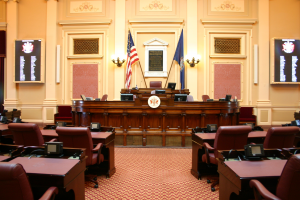 by Grady Brown There has been some recent action in the Virginia General Assembly concerning state marijuana laws. At the end of January, the Senate Courts of Justice Committee killed Senate Bill 686, which would have decriminalized marijuana possession and lowered the penalty for possession from $500 to $100. However, the Republican controlled Courts and Justice Committee rejected the bill in a party line 9 – 5 vote. The bill was faced with strong opposition from law enforcement organizations. While the Senate rejected decriminalization, it did pass Senate Bill 1235, which would loosen medical restrictions on cannabis oils. A similar bill in the House of Delegates has also passed through committee. Should the bill be signed into law, epilepsy patients in the Commonwealth would be able to use marijuana oils to help treat seizures. Gov. Terry McAuliffe has already expressed his support for the bill. The mixed results in Richmond show a divided General Assembly, but a March 2014 poll from Quinnipiac University poll reported 84 percent of Virginia voters supported legalizing medical marijuana, while 13 percent were opposed. However, legalized marijuana for recreational use is still divided, with 46 percent of Virginia voters in favor and 48 percent opposed. The poll’s margin of error was +/- 2.7 percent. National support for legalized marijuana is also increasing, with a recent Gallup Poll showing 51 percent in favor and 47 percent opposed with a 4 percent margin of error. Virginia appears set to only make changes in their medicinal marijuana laws. Still, proponents of legalized marijuana point to some benefits of legalization. According to Cato institute, Virginia spent more than $125 million on marijuana prohibition expenditures. A leading argument for legalizing marijuana is turning those expenditures into revenue. The same Cato study found that Virginia generate nearly $75 million in marijuana tax revenues.
Proponents of marijuana decriminalization and legalization laws point to the racial implications of such laws. According to the ACLU, arrests of African American accounted for 43.4 percent of total 2010 marijuana related arrests in Virginia, despite making up 20 percent of the state’s population. Many states see similar disparities. According to the National Household Survey on Drug Abuse and Health, the percent of White and Black population that reports using marijuana is nearly the same. Harsh marijuana laws, then, seem to unfairly target minority groups. Nevertheless, one aspect of the debate that is hotly contested is the health effects of recreational marijuana use. While there are studies on both sides, there hasn’t been enough conclusive evidence to form a consensus. The American Medical Association continues to oppose the legalization of marijuana, arguing, “cannabis is a dangerous drug and as such is a public health concern.” The American Academy of Pediatrics also reaffirmed its opposition to legalized marijuana earlier this year, stating, “We know marijuana can be very harmful to adolescent health and development.” While Virginia appears to be on the verge of easing medical marijuana laws, with the defeat of the decriminalization bill, the State will stay in line with most other states, who have remained opposed to easing marijuana laws. Proponents of marijuana legalization laws will likely pay close attention to Alaska, Colorado, Oregon, and Washington, as these states see the impact of legalized marijuana.
0 Comments
Your comment will be posted after it is approved.
Leave a Reply. |
Categories
All
Archives
April 2022
|
ADDRESSVirginia Policy Review
235 McCormick Rd. Charlottesville, VA 22904 |
|
SOCIAL MEDIA |